These days fruit juicers are becoming an essential kitchen appliance. This is because more people aim to live a healthy lifestyle, and because fitness and health professionals promote juicing as a means of getting the right amount of nutrients daily.
There are many types of fruit juicers on the market, ranging from manual juicers to larger restaurant-style models, but some are proving to be more popular than others. This article will highlight the key factors to consider when selecting a fruit juicer, so that businesses can be confident they are stocking the best models available on the market today.
Table of Contents
Fruit juicers on the global stage
Tips for buying fruit juicers
The most popular types of fruit juicers
Concluding thoughts
Fruit juicers on the global stage
In recent years there has been growing demand to have healthy, energy-boosting juices incorporated into daily diets. Traditionally, these juices were purchased at cafes or restaurants, but now people are looking for ways to make juice and smoothies conveniently at home. This, along with the growth of the restaurant and hotel industry, has helped to cause a sharp increase in demand for fruit juicers.
In 2020, Business Wire estimated the global juicer marker to be worth US $172.3 billion, and this number is expected to grow to US $199.4 billion by 2027. The top consumers for fruit juicers in today’s market are young people or parents who live a busy lifestyle. And this high demand for new and improved fruit juicers has led manufacturers to look at different ways to get the most nutrients out of the fruit. This, in turn, has led to a surge in the varieties of fruit juicers on the market, with the US leading the charge in consumer demand.
Tips for buying fruit juicers
Fruit juicers have evolved over the years. But not every fruit juicer has the same features or output. Factors such as juice quantity, pricing, and overall noise level are just some of the things to keep in mind. So read on for a breakdown of the key things to consider when choosing a fruit juicer.
Quantity of juice
The amount of juice a fruit juicer can make at one time is very important. Consumers will take into account how many people they are making juice for, how many times a week they intend to use the fruit juicer, and how long it takes to make a glass of juice. And for businesses, this may mean purchasing a pricier fruit juicer to help speed up the serving process.
What fruits will be juiced
The fruit juicer market is filled with different styles and designs. There is everything from citrus juicers to machines that can juice fruit and vegetables at the same time. Not every juicer will be able to excel at juicing every fruit out there, so taking into account what type of fruit will predominantly be used in the juicer helps in the decision making process. For example, those blending hard fruits should look towards a masticating juicer as opposed to a manual juicer.
Pricing
It should come as no surprise that pricing is a big factor when selecting a fruit juicer. Manual citrus juicers are the cheapest on the market, but they’re only compatible with a select amount of fruit, and aren’t the most efficient either. Fruit juicers that produce a higher yield come at a higher price tag, but for someone doing a lot of juicing it may well be worth investing in a higher-quality fruit juicer that will prove more effective and efficient over time.
Assembling and cleaning time
Some juicers have more parts than others, making them more time consuming to clean. However, most juicers can be taken apart easily and can be cleaned relatively quickly. Manual citrus fruit juicers, for example, can be put in the dishwasher as they have no electric parts in them, but the more expensive juicers will have to be hand washed. Assembling and cleaning time can add up so it’s important not to overlook it when choosing the right model.
Noise level
The noise level of a fruit juicer is also an important consideration. Generally speaking, the more expensive a machine is, the less noise it will create, although some citrus juicers, especially manual models, can have lower noise levels. And while noise levels may not be that important to businesses, the household is a different matter. Nobody wants an overly noisey fruit juicer, especially if the juice is being made in the morning.
Capacity
Finally, another consideration when purchasing a fruit juicer is its overall capacity. A small juicer may be acceptable if it’s being used within the household for a small number of people, but it won’t be the best option for a business who is in constant need of greater quantities of juice. Some juicers come in the same style but have a variety of capacities to choose from, so it’s important to make sure the model one selects matches the quantity one hopes to produce.
The most popular types of fruit juicers
Fruit juicers such as reamers, centrifugal juicers, masticating juicers, and twin-gear juicers are all very popular options in today’s market. So read on for a breakdown of what each type has to offer.
Manual citrus juicers
The citrus juicer is a staple part of many people’s kitchens, and has been for many years. What draws people to this type of fruit juicer is how inexpensive yet effective it is. It’s the simplest juicing device on the market, and is traditionally used as a lemon juicer or an orange juicer, but can be used for other citrus fruits as well. The citrus reamer also collects the excess pulp that’s being squeezed, making it mess-free and providing people with a smooth juice.
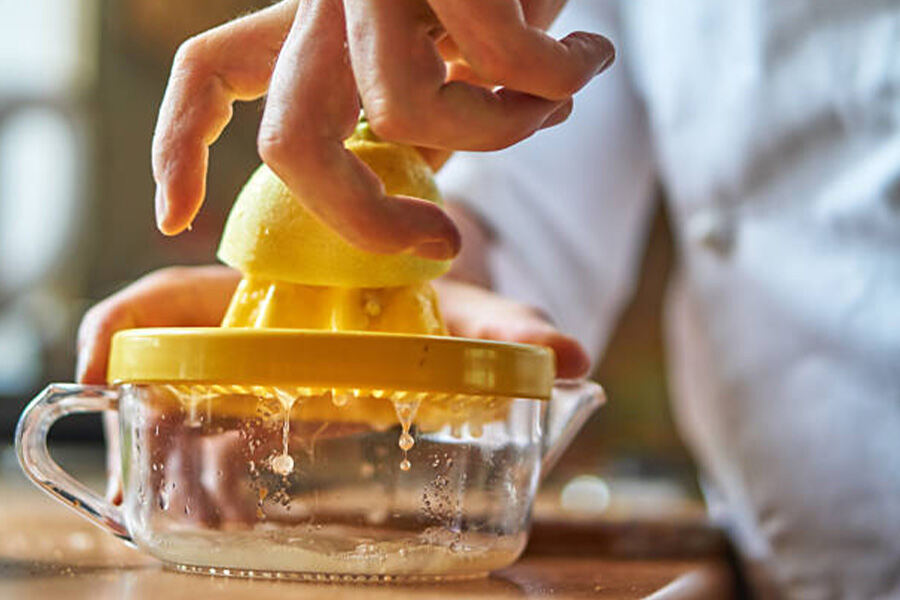
Advantages
- Costs very little
- Easy to use and clean
- Very little mess involved
Disadvantages
- Limited amount of juice can be made at one time
- Can only be used with citrus fruits
Electric reamers
The electric reamer is easier to use for people who may not have much strength in their arms to manually press the citrus fruit. It’s also not as expensive as larger electrical fruit juicers, making it a good alternative for those on a limited budget. This type of juicer is very easy to clean and will make orange juice or other citrus juices at a quicker rate than the manual juicer, and with less effort.
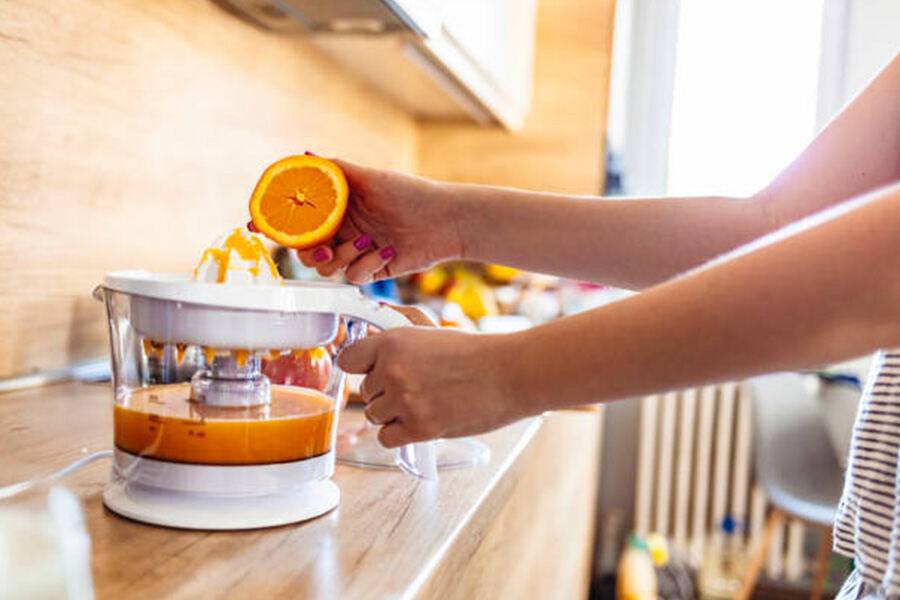
Advantages
- Makes juice faster than a manual juicer
- Less effort to use than a manual citrus juicer
- Not as expensive as other electrical juicers but still effective
Disadvantages
- Limit to the amount of juice it can hold
- Can only be used with citrus fruits
Centrifugal juicers
Juicing is no longer only for hotels and restaurants, it’s becoming increasingly popular within households as well. Not all juicers are for everyone, and some can be very expensive for people who have a specific budget, which is where centrifugal juicers come in. This type of juicer is the next step up from manual juicers, and uses centrifugal force to extract the juice from chopped up fruit and vegetables. They’re quick and inexpensive compared to more high-end juicers.
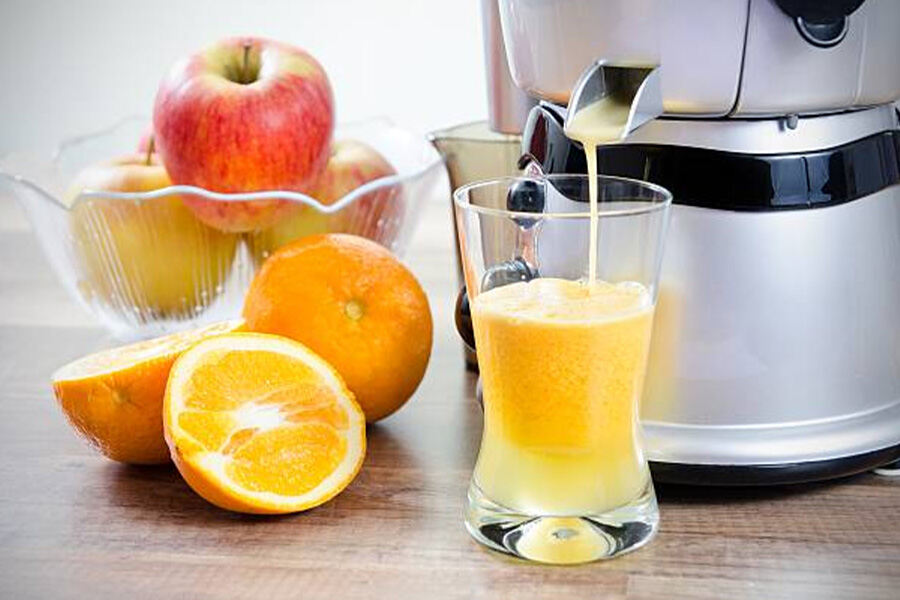
Advantages
- Good alternative to high-end juicers
- Not just for citrus fruits
- Faster juice yield than citrus juicers and easy to use
Disadvantages
- Uses heat and oxidation to make juice
- Useful for beginners
- Can be noisy with harder fruits and vegetables
Masticating juicers
The big difference with the masticating juicer is that it essentially chews the ingredients and extracts the juice and nutrients. in a slower way that many prefer to other high speed electrical juicers. This juicer needs more preparation work than others, as the pieces need to be much smaller. It produces a higher yield than faster juices, and is known to create drier pulp and a smoother texture. It’s often referred to as a cold-press juicer.
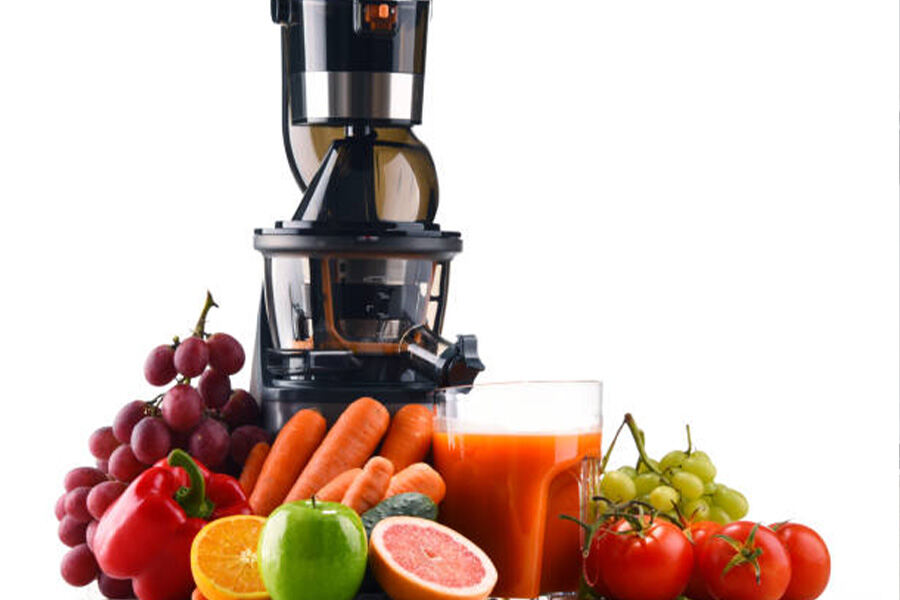
Advantages
- Produces a higher yield than other juicers
- Smoother overall texture
Disadvantages
- Requires more preparation of fruits and vegetables
- Has a slower speed than other electrical juicers
- Takes longer to clean
Twin-gear juicers
The twin-gear juicer uses a double squeezing system that helps to improve the results of juicing. It works slower than a masticating juicer and as a result it creates a more nutrient-rich juice. This means that the juice can be stored for a longer period of time due to the elimination of excessive oxidation. It’s great for juicing all types of fruits and vegetables, and can even be used as a pomegranate juicer. The twin-gear juicer tends to be quieter than other electrical juicers, which is another reason for its popularity.
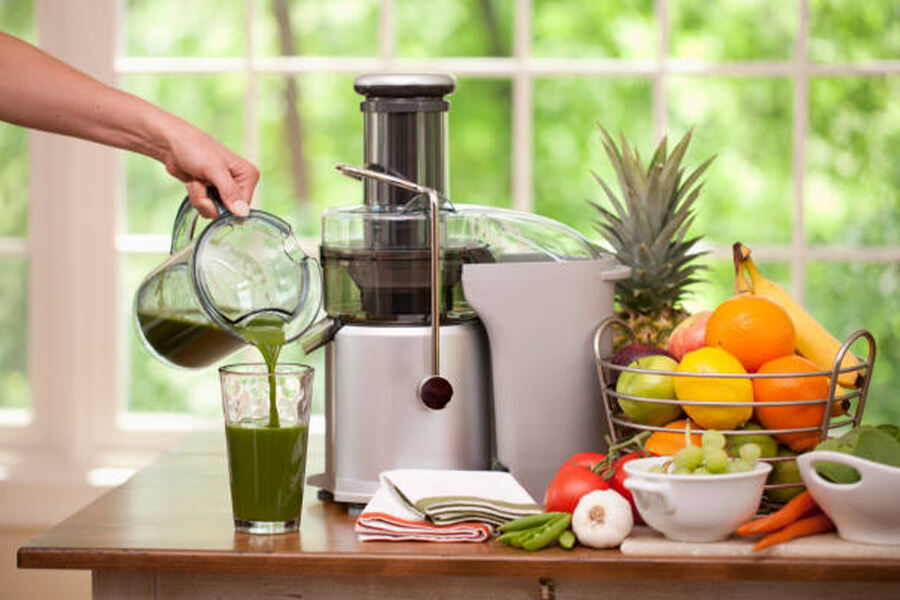
Advantages
- The double squeezing improve juice quality
- Juice can be stored for longer
- It is suitable for all types of fruits and vegetables
- Quieter than other juicers when in use
Disadvantages
- Slow and more expensive than masticating juicers
- It doesn’t create an overall smooth texture
Concluding thoughts
An increase in healthy lifestyle changes has marked a rise in demand for fruit juicers, and there are now fruit juicers out there that match all types of needs and budgets. Also, with people looking to spend more on kitchen appliances, even the more expensive fruit juicers are no longer off limits to the average shopper. The result is that citrus juicers, masticating juicers, twin-gear juicers, and centrifugal juicers are all set to continue to be popular products, in both the hospitality industry as well as in the household.



